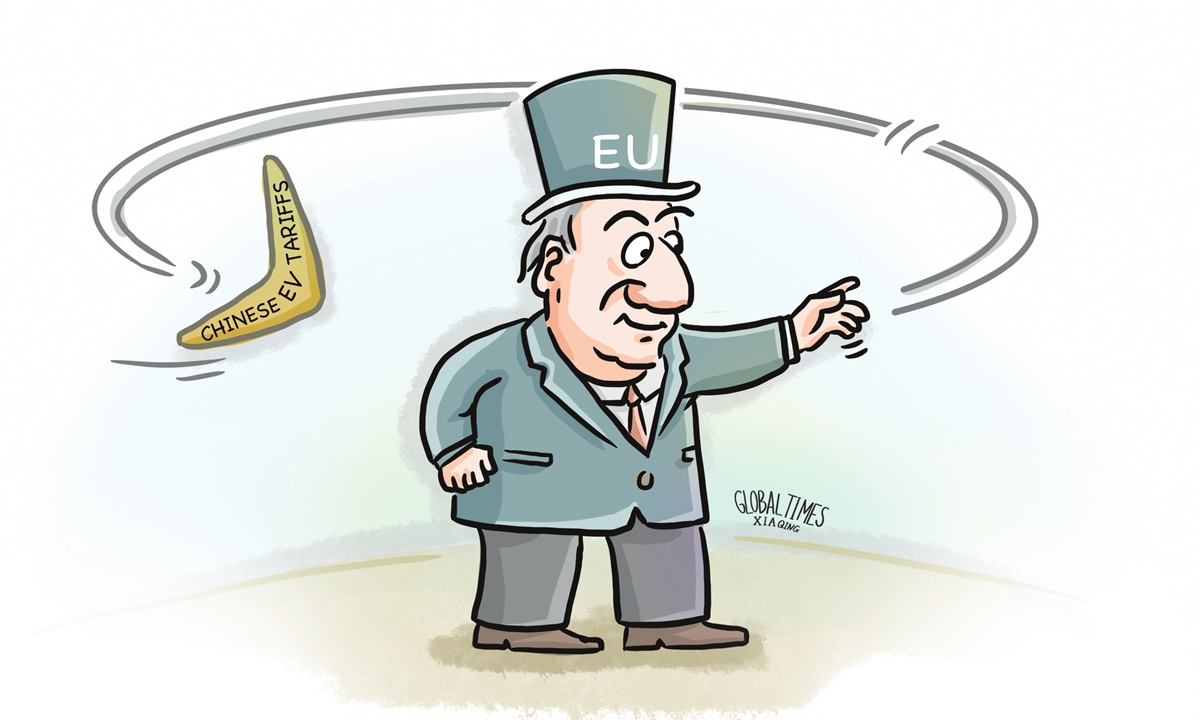EU tariff plan on Chinese EVs a classic case of ‘hoisting with one’s own petard’

Illustration: Xia Qing/GT
Earlier this month, the EU voted to adopt definitive tariffs on China-made battery electric vehicles (EVs). If China and the EU cannot reach an alternative agreement through negotiations, the new levies are expected to take effect by October 31.
Previously, the bloc claimed that cheap Chinese EVs that benefit "heavily from unfair subsidies" pose a "threat of economic injury" to European EV producers. The EU's insistence that "overcapacity" and "government subsidies" have given China's EV industry an unfair competitive advantage in international trade lacks common sense. As far as specific industries are concerned, there is no necessary connection between the competitive advantage of products and the amount of production capacity.
Notably, there is indeed disagreement within the EU about the "Chinese overcapacity" theory. It is reported that the global EV market will continue to grow strongly for the next few decades, and since Europe's own EV industry is far from meeting the needs of its internal market, it will continue to rely on imports for EV parts and components. Therefore, the "overcapacity" theory serves as a poor excuse for implementing trade protectionist measures.
The claim that China's "highly subsidized" EV industry gains an unfair competitive advantage is a cliché. In fact, the Chinese government canceled the per-vehicle subsidies for EVs at the end of 2022, and the current competitive advantage of the country's EV industry stems more from the innovation capabilities of Chinese EV producers. What Europe is reluctant to acknowledge is that many major countries on the continent have heavily subsidized their EV industry to promote growth in the early stages. Thus, the attacks on China's "government subsidies" aim to cover up the European EV industry's lack of technological innovation, completely exposing Europe's inefficient social organization and management capacity, as well as its double standard in international trade.
In this context, Europe's tariffs on Chinese EVs will not only fail to protect the domestic automotive industry, but will also further damage its international competitiveness.
First, the tariffs will lead to an increase in the price of EVs, which will ultimately be borne by consumers. This will directly impact the promotion of EVs in Europe, and a decline in EV demand will result in a reduced vitality in the automotive market across the continent. The European automotive industry is likely to fall into a vicious circle of insufficient product innovation and weakened market demand.
Second, as European automakers are already facing the challenge of transformation, the tariff increase will result in the rising cost of imported auto parts. This will seriously hinder China-EU cooperation in high-end manufacturing technology, with Chinese investors showing less interest in investing in Europe. This man-made supply chain crisis will undermine technological innovation in Europe and damage its goals of industrial transformation and upgrading.
More importantly, sacrificing the trade chain between China and Europe in the EV industry will further aggravate the division within the bloc. In the voting earlier this month, the vast majority of EU member states didn't agree with the tariff increases. Countries like Germany and Hungary have clearly expressed their opposition.
Whether this move by the EU will trigger a fundamental crisis of economic integration within the bloc at a broader political level remains to be seen. However, it is clear that opposing voices can be heard within the European automotive industry regarding this matter. Major car manufacturers, such as BMW and Mercedes-Benz, which deeply recognize the importance of the Chinese market to their global operations, have criticized the tariff increase. There is a basic consensus within the European automotive industry that technology and investment from China are crucial to its green transformation.
In essence, the EU's trade protectionist policy of imposing tariffs on Chinese EVs is a classic case of "hoisting with one's own petard." In light of the current development of the European automotive industry, the EU needs to actively participate in international competition and cooperation with an open attitude.
This is the only way to drive the flow of other factors of production, promote the transformation and sustainable development of the European automotive industry, as well as maintain and further expand its global competitiveness.
The EU should be cautious about waging a "trade war" to "defend the development of its industry," as this detrimental economic policy could fundamentally undermine the prospects for the growth of its automotive sector in the coming decades.
Gao Jian is director of the Center for British Studies at Shanghai International Studies University. Fu Borui is an assistant research fellow of the Center for British Studies at Shanghai International Studies University. opinion@globaltimes.com.cn

